- Home
- Barbara Metzger
Minor Indiscretions
Minor Indiscretions Read online
Table of Contents
Copyright
Dedication
Minor Indiscretions
Chapter One
Chapter Two
Chapter Three
Chapter Four
Chapter Five
Chapter Six
Chapter Seven
Chapter Eight
Chapter Nine
Chapter Ten
Chapter Eleven
Chapter Twelve
Chapter Thirteen
Chapter Fourteen
Chapter Fifteen
Chapter Sixteen
Chapter Seventeen
Chapter Eighteen
Chapter Nineteen
Chapter Twenty
Chapter Twenty-One
Chapter Twenty-Two
Chapter Twenty-Three
Chapter Twenty-Four
Chapter Twenty-Five
Epilogue
Minor Indiscretions
By Barbara Metzger
Copyright 2013 by Barbara Metzger
Cover Copyright 2013 by Ginny Glass and Untreed Reads Publishing
Previously published in print, 1991 and 2002.
This ebook is licensed for your personal enjoyment only. This ebook may not be resold, reproduced or transmitted by any means in any form or given away to other people without specific permission from the author and/or publisher. If you would like to share this book with another person, please purchase an additional copy for each person you share it with. If you’re reading this book and did not purchase it, or it was not purchased for your use only, then please return to your ebook retailer and purchase your own copy. Thank you for respecting the hard work of this author.
This is a work of fiction. Any resemblance to the living or dead is entirely coincidental.
Also by Barbara Metzger and Untreed Reads Publishing
A Loyal Companion
A Suspicious Affair
A Worthy Wife
An Angel for the Earl
An Enchanted Affair
Autumn Glory and Other Stories
Cupboard Kisses
Father Christmas
Lady in Green
Lady Whilton’s Wedding
Miss Treadwell’s Talent
Rake’s Ransom
Saved by Scandal
The Duel
The Hourglass
The House of Cards Trilogy
The Scandalous Life of a True Lady
Valentines
Wedded Bliss
http://www.untreedreads.com
This one is for the memory of old friends
Minor Indiscretions
Barbara Metzger
Chapter One
The bags were packed; the hired chaise waited outside. It remained only to sit through the head mistress’s parting speech, and Miss Melody Morley Ashton would be free. After ten years of enforced education, Melody had learned patience along with grammar and globes, dance steps and deportment. She sat in perfect dignity and composure, her back straight, her fine green eyes lowered in respect, prepared to swallow Miss Meadow’s own blend of tea (far superior to that served the students) along with the old windbag’s own brand of niggling nastiness. Miss Meadow was small in stature, smaller in mind, and smallest of all in human kindness, according to the students at the Select Academy for Young Ladies, located outside of Bath, which Melody would soon be leaving, praise be!
“All young things must eventually leave the nest,” the dumpy little matron recited, waving her pudgy hands around. “They must try their wings, take to the air.”
The young woman on the other side of the desk still wore a demure smile, wondering if Old Meadowlark was going to have her digging for her own worms before she was at last excused.
“Of course you are a trifle underage. We do prefer our young ladies to attend classes until they are eighteen. Those final courses in decorum are so crucial, don’t you know.”
Miss Ashton knew it nearly broke Miss Meadow’s nipfarthing heart to return the unused tuition. As for the roll of guineas now wrapped in a handkerchief secured in Melody’s reticule, tears had almost come to Miss Meadow’s beady little eyes at having to hand over the money set aside for a student’s incidental expenses.
“And yet, I do not feel I need worry about you casting shadows on the school’s fine reputation. As I wrote to your dear mama, you have been one of our least troublesome, ah, best students. True, your musical abilities will never grace a drawing room, but that cannot be held against the school, now can it?” She tittered.
Melody tilted her head, her thick chestnut curls braided neatly into a coil at the back of her proudly held neck. She remembered agonizing, humiliating hours of practice, and folded her hands in her lap.
“No, as I told your mother, now that you have matured past a tendency to show inordinate temper, you are not one of the flighty girls with all their fits and starts who are no more suited to make an early debut in the ton than the cook’s pot girl. I would be embarrassed to have some of them pitch-forked into the haute monde. Poor reflection on the academy, don’t you know.” Miss Meadow plopped another almond tart into her pouched cheeks. “When your mother wrote that she wanted to introduce you at some small local gatherings and a house party or two before the Season officially started, I was not terribly concerned. After all, you will not be alone and untutored if you find yourself at a loss in the wider range of polite society. Your mother will be there to guide you, and you must consider yourself fortunate indeed. Your mama turned out to be a fine lady. After a regrettable beginning, of course.”
Ah, so there was to be a final examination after all. Miss Ashton bit down on her pride and temper, while Miss Meadow bit down on a macaroon. Melody nodded, her outward composure not touched by the gratuitous innuendo. Not after ten years.
She returned Miss Meadow’s squinty black stare with a cool green gaze. “As you say, only the most narrow-minded of gossips would reflect on an age-old scandal. And Mother has certainly proven her gentility a hundredfold, not merely by being a cherished member of society, but with her truly noble charitable acts: running an entire orphanage by herself since Aunt Judith passed on, to say nothing of making a life for herself and her daughter with the passing of my father, and staying loyal to his memory…. I shall try very hard to live up to her good name.”
Yes, Miss Ashton was mature beyond her seventeen years. If she could not be rattled by mention of the family’s dirty linen, she would have no problems with those haughty Almack’s patronesses and those other high-in-the-instep keepers of the ton whose approval was so necessary for a girl’s success on the Marriage Mart. “Your own loyalty does you proud, my dear. Just maintain your values and the lessons we have drummed—ah, imparted to you, and do not let yourself be infected with all those romantic notions’ harum-scarum young girls are so prone to. Novels”—she shuddered at the word—“put more foolish ideas in more empty heads than a hundred teachers can displace in a lifetime. I am sure you will not succumb to such dire temptations.”
Miss Ashton crossed her fingers and assured the old besom that she wouldn’t think of such a thing, aside from the four purple-bound volumes smuggled into her luggage by her classmates.
To guarantee that a promising young mind was not corrupted, at least until in her parent’s care, Miss Meadow then handed a small book to Melody as a parting gift. No larger than her hand, it was a hefty little tome, with pearl-inlaid wooden covers, embossed gold corners, and sticky fingerprints.
“I am sure you will find it comforting and informative on your journey home. Please accept it with our very best wishes for your success.”
Miss Ashton stood, her medium height at least six stately inches above the dumpy headmistress, and gave
her best curtsy. Then she stuffed Mingleforth’s Rules of Polite Decorum into her reticule, although the weight made the strings dig into her arm, and left before she was betrayed by a very girlish giggle indeed.
*
The bags were loaded; the hired chaise was off. Miss Melody Ashton tossed back the hood of her new velvet cape, green to match her eyes, and shook her head, loosening tiny reddish-brown curls to frame her cheeks.
“And good riddance,” she shouted joyfully at her last glimpse of the ugly brick building. Then she quickly reached over to clasp her companion’s hand.
“I’m so sorry, Miss Chase. That was thoughtless of me, for you are not free of the place as I am.”
Her fellow traveler, one of the younger instructors at the academy, begged her to pay no mind. “I cannot blame you for high spirits, my dear. I am only pleased I was selected to accompany you to your home. Even three days…” She bit her lip, having said too much.
Melody squeezed the limp hand she held before sitting back on her own side of the carriage. “I know, I shall ask Mama if you cannot accompany us when we go up to London. She won’t want to visit the Tower or Westminster or all the lending libraries I am anxious to see, and I cannot go by myself, of course. It will be perfect.”
“Yes, dear,” Miss Chase answered without conviction, five years at Miss Meadow’s having left her with little hope and fewer dreams. The expectation of days in a jouncing carriage, indifferent food, and unaired sheets at various inns, and then a return journey alone on the mail coach, was a positive treat compared to a junior mistress’s life at the school. She was happy enough to sink into an exhausted slumber.
Left to her own devices, Melody untied her reticule’s strings and, with a smile that showed one quicksilver dimple, drew forth Miss Meadow’s gift and read the inscription inside the front cover: The child who is shown the path, and knows the path, will follow the path. She chuckled softly, thinking of primrose paths and paths to hell. Trust Miss Meadow to adopt addlepated profundity when With our best wishes would have done. Melody closed the book and fumbled with the window latch.
“Oh no, my dear, you mustn’t,” Miss Chase murmured.
“But I was just going to—”
“The dust from the road and the cold, you know.” Miss Chase shivered in her threadbare pelisse.
Melody hurriedly fastened the window and tucked the lap robe around her companion, who promptly closed her eyes again. Melody ruefully stuffed Mingleforth’s Rules of Polite Decorum back into her overloaded purse. Perhaps it would come in handy someday for propping up a chair leg, or providing kindling, or lining a canary’s cage. Not that Miss Ashton owned a canary, but she had always hoped to. She had always hoped for pretty gowns, balls, and jewels, putting her hair up, sipping champagne, and meeting the Prince. She pulled her cape closer around her and settled into her own comfortable corner, her green eyes drifting shut, a smile on her pretty face.
For Melody Morley Ashton, levelheaded, dignified, and mature, had more than a few romantic notions. A love match, that’s where her dreams always led. She knew she was supposed to marry well; what girl at Miss Meadow’s didn’t know the point of her existence? Each proper female’s mission was to add consequence to her family, to join her name to someone with a higher title or deeper pockets, preferably both. That fact of life was taught to even the youngest pupil, along with drawing room accomplishments, and everything and anything to attract this most eligible of partis.
Let him be wealthy and well connected, Melody prayed, but mostly let me love him. Let me know a grand passion, like Mama.
Of course, Melody did not wish to marry a ne’er-do-well, sporting-mad gambler as her mother had. She barely remembered her handsome father, dead on a muddy field due to too high a fence and too deep a bottle, leaving her and her mother impoverished. But at least her mother had had her grand passion, a runaway match, a love that survived parental disapproval and society’s strictures, if not an unbroken gelding. Lord Ashton’s untimely death—and unpaid bills—had left his wife and young child homeless and hopeless.
Please, let him not be a second son, Melody’s prayers continued.
Lady Jessamyn Ashton’s only course was to throw herself and Melody on the untender mercies of her much older sister, Judith Morley, a moralistic, man-hating spinster who had inherited the Oaks, the Morley ancestral home at Copley-Whitmore. Aunt Judith devoted her life to good deeds and her ward Felice, the daughter of Sir Bostwick Bartleby, the nabob. Felice devoted her life to making Melody miserable. Felice was two years older, china doll pretty, and graceful. Melody was sallow faced then, scrawny, and awkward. She was a brown study, quiet child. Blond-haired Felice was not.
“Your papa gambled all his money away; my papa is in India, adding to his fortune. You’ll have no dowry; I’ll have diamonds and rubies and pearls. You’ll marry a farmer; I’ll marry a maharajah, if I choose.”
Somehow Lady Ashton found enough money to send Melody to school, and somehow she found the means to reenter society, floating from country house party to Irish hunt meeting, from seashore excursion to London Season, during Melody’s vacations at the Oaks or not. Even after Aunt Judith’s death, Lady Jessamyn continued her social rounds and yet maintained Judith’s good works. Melody dreamed of making her mother proud, this mother she hardly knew, who was everything a lady should be.
Now was Melody’s chance to have it all, the Season, her mama’s company, true love. Unfortunately, Felice was waiting with Mama at the Oaks.
So let him not prefer blondes.
Chapter Two
Daydreams are peculiar, taking on lives of their own. Think of the inveterate gambler who is positive his horse will win the next time. He’ll lay all his blunt on the nag, even borrow on his optimism. He’ll decide to pay off his bills, treat himself to a fine dinner on the winnings, even hand his wife a few of the flimsies, maybe. The money is all spent before the horses leave the starting line. Just so, by the next morning Miss Ashton was the Season’s Incomparable, the belle of every ball, in her mind’s eye. London beaux were at her feet writing sonnets to her eyebrows, while one gentleman in particular…
As for Miss Chase, the downtrodden, colorless schoolteacher, she was delighted with an ample, hot meal at last night’s inn, and the fact that there were no creatures sharing her bed.
So the next morning, who was most devastated by the change in plans? On being informed that she was to return to Bath with the hired chaise, Miss Chase was only mildly affected. She would miss another day or two of freedom, but she was richer by a good night’s rest, a full breakfast, and two of Miss Ashton’s precious guineas. Perhaps she was correct: hope for little, and you won’t be disappointed.
For there, at the first change, along with Mama’s note that Melody should proceed in the family carriage, was the death of all her fantasies. This killer of dreams, slayer of wishes, sat like a dark specter in the inn’s parlor: Nanny. Melody’s nanny, her mother’s nanny, perhaps Queen Guinevere’s nanny, she’d been at it so long. Nanny in her starched black gown, black bonnet, black mustache, with her ubiquitous knitting, was truly the hangman of hope.
“Cow’s dry. Well’s dry. You be wanted to home.”
Doom.
The bags were unloaded; the hired chaise pulled away.
“Nanny?”
“Money’s gone. Can’t get blood from a turnip, I says.”
“From a stone, Nanny. You cannot get blood from a stone. But what—”
Nanny shook her head and kept on knitting. “All that learning. A body can’t eat stones, missy. Nor books nor fine ideas. Head as hard as rocks. Hard times.”
“Do you mean we’re…poor?”
“We were always poor. What’s worse than poor?”
“But, but Mama and the orphans and—”
“Your mama’s in a decline, children running wild. Servants gone. Constable’s nosing round. We’ll be digging acorns next, I told her. Tried eating toads, missy?” At Melody’s gasp she guessed not. “
Bein’t all bad, howsomever. Some of us got our health. Not Ducky nor little Meggie, a course, who’s never been a strong ’un, and some of the boys is sniffling. Your ma hardly gets out of bed these days. Then there’s my rheumatics and—”
“But what happened? What about all the plans for house parties and a London Season?” Melody plucked at the folds of her new, expensive cape. “My new clothes?”
Nanny turned her nose up at the green velvet. “Here, you’ll need this.”
This was a wool scarf she uncoiled like a rope from her workbasket and wrapped around Melody’s throat. It was that same scratchy, undyed wool Nanny always used, with the smell of sheep still in it. Melody could feel rashes on her chin already. “But—”
“Air dreams, your mama always had her head filled with air dreams. She’ll tell you. You’re needed to home, is all I’m supposed to say.” And Nanny pursed her lips, gathered up her knitting, and stomped out the door.
Heaven help us, the bags were being loaded. The rickety, ramshackle, crumbly old family carriage stood waiting. In Melody’s memory only chickens had used it, for roosting. The neighborhood of Copley-Whitmore was small enough to get everywhere on foot, and Aunt Judith had been a firm believer in healthful exercise—rain, sleet, or snow. An ancient driver was at the reins, muffled to the eyes in another undyed wool scarf.
“Isn’t that old Toby from Tucker’s farm? Why, he’s more used to driving—” Yes, now that she looked closer, those were indeed plow horses between the traces, huge, placid beasts that had one gait, a ponderous, plodding walk. “Why, it will take forever to get home behind those animals.”
The old man cackled. “Aye, but they’ll go in the prettiest, straightest line you ever seen.” Then he scratched his chin.
*
At least she was not going to hell in a handcart, Melody decided, wrinkling her nose. She was getting there slower, in a henhouse on wheels.
The horses plowed on. Urging Toby to greater speed was fruitless, for the old man was quite deaf when it suited him. Nanny knitted, like the Fates weaving Melody’s future in itchy skeins. There was no budging Nanny from her decision to stay mumchance on everything Melody wanted to know either. Conjecture was pointless, so Melody tried to settle back on the odoriferous squabs, but loose horsehair stuffing kept pricking into her back, and the badly sprang carriage kept rocking her head and shoulder into the unpadded door. Life at Miss Meadow’s was taking on a rosier cast.

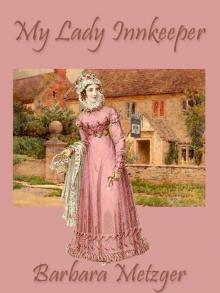 My Lady Innkeeper
My Lady Innkeeper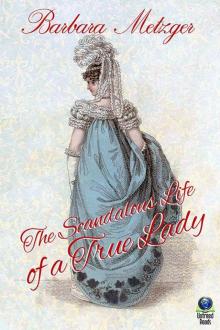 The Scandalous Life of a True Lady
The Scandalous Life of a True Lady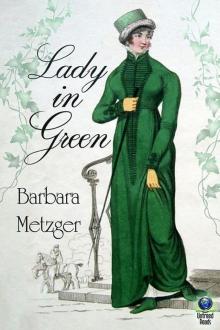 Lady in Green
Lady in Green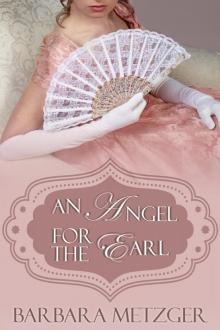 An Angel for the Earl
An Angel for the Earl Truly Yours
Truly Yours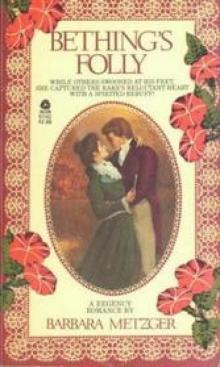 Bething's Folly
Bething's Folly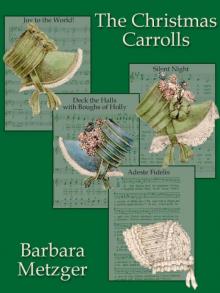 The Christmas Carrolls
The Christmas Carrolls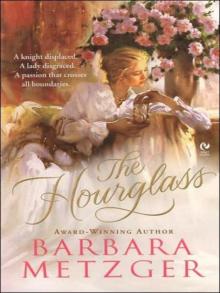 The Hourglass
The Hourglass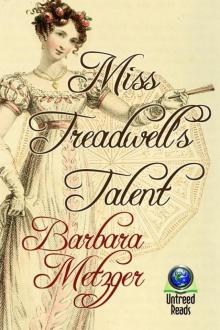 Miss Treadwell's Talent
Miss Treadwell's Talent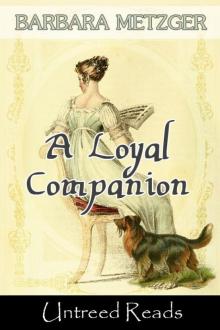 A Loyal Companion
A Loyal Companion Love, Louisa
Love, Louisa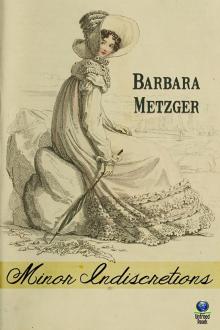 Minor Indiscretions
Minor Indiscretions Jack of Clubs
Jack of Clubs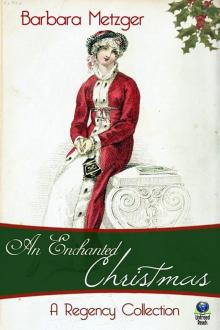 An Enchanted Christmas
An Enchanted Christmas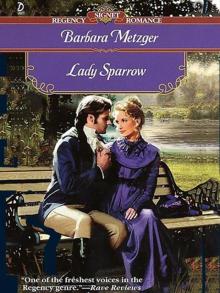 Lady Sparrow
Lady Sparrow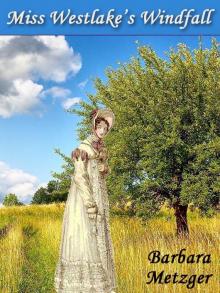 Miss Westlake's Windfall
Miss Westlake's Windfall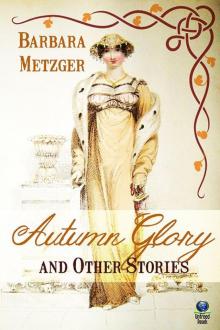 Autumn Glory and Other Stories
Autumn Glory and Other Stories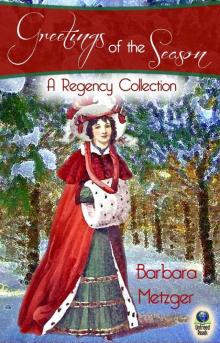 Greetings of the Season and Other Stories
Greetings of the Season and Other Stories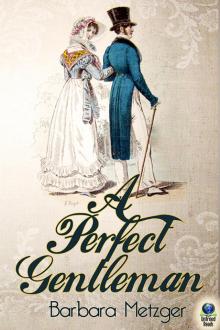 A Perfect Gentleman
A Perfect Gentleman